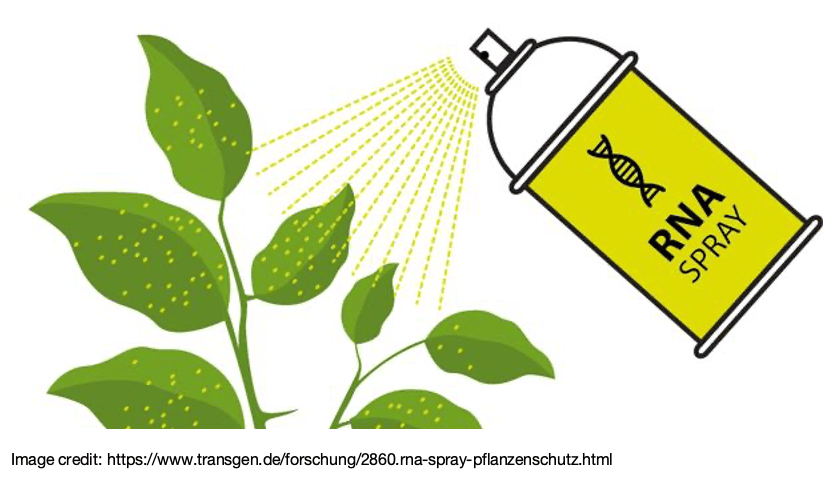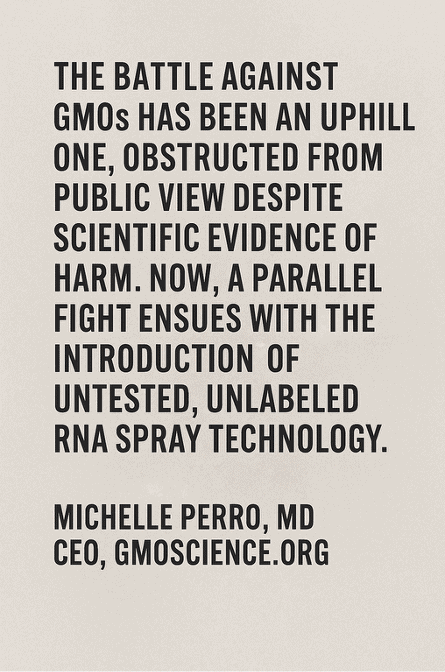Terrana Biosciences, launched by Flagship Pioneering, the creator of Moderna, received a $50 million initial investment and government approval for experimental-use authorizations, raising ethical and public health alarms.
The company pioneers RNA-based agricultural traits throughout a “proprietary technology platform”. The company claims that their approach will empower farmers with “…precise, adaptive solution to combat threats to crops in fields and orchards and enhance resiliency, sustainability, and productivity in the global food system.”
Is this an incredible breakthrough or more of the same rhetoric that we endured and heard spouted with GMOs that turned out to be an environmental and health disaster?

Instead of modifying DNA, Terrana’s spray-on RNA platform delivers engineered RNA molecules through tiny tears in plant leaves; these enter plant cells, replicate, and can express proteins such as viral antigens, insecticidal Cry toxins, or climate‑resilience genes designed to act as programmable plant vaccines.
Thus, Terrana will use RNA from plant viruses as a chassis to carry pieces of “cargo RNA” into a plant to help it fight infections and insects, and deliver vaccines.
The CEO of Terrana (and a Flagship partner), Ryan Rapp, says we should think of this “…like software. You can stick a floppy disk or USB drive into the computer and give it a set of instructions. This is the first time we’ve had a platform where we can actually do this in plants”.
Terrana CEO Ryan Rapp: “We are guving humanity this other tool as we start of deal with climate change to help us deal with the effects on food supply and production.” (Terrana Biosciences)
Kids aren’t software updates! Keep synthetic RNA off their plates.
The approach by Terrana differs from those using RNA interference (RNAi) on crops. The EPA gave the green light to farmers in 2024 to use an RNAi insecticide from GreenLight Biosciences. When consumed by beetles, the RNA silences their survival gene.
Why RNA Sprays Are More Dangerous Than GMO Crop Modifications
No Long-Term Data or Human Health Studies
RNA sprays are deployed without long-term safety data on human exposure, children, or immune and reproductive effects. The technology remains unlabeled, and liability protections are in place under experimental regulatory frameworks.
Unregulated, Unlabeled, and Legally Immunized
Terrana’s products fall under experimental authorization, meaning neither Terrana nor government agencies bear liability for adverse outcomes. There is no mandatory labeling, so consumers cannot give informed consent or opt-out.
Potential Immunological & Reproductive Risks
RNA molecules entering human food supplies may alter gut-associated lymphoid tissue (GALT), raising unknown immunological consequences in children. Repeat exposure could disrupt hormonal signaling, endocrine pathways, or even transgenerational development (affecting our offspring), given RNA’s potential systemic persistence.
Environmental Persistence and Heritability
Terrana claims some RNA constructs may be heritable across plant generations, raising the alarm about unintentional spread across species and ecosystems. This uncontrolled gene expression mirrors historically what we have witnessed with GMOs, only magnified by a sprayable, replicable system.
A Physician’s Warning:
The fight against GMOs has been an uphill battle, with industry and regulatory agencies suppressing public awareness despite mounting and censored scientific evidence of harm.
——
This is the same pattern of secrecy and dismissal now repeating itself with the untested, unlabeled RNA spray technology being pushed onto our food and environment.
Governmental Oversight: Why So Creased?
The EPA has already approved RNA-based applications such as GreenLight’s RNAi spray in 2024. Terrana’s RNA is more advanced: it enters the plant interior and replicates, rather than merely coating leaves like earlier RNA sprays. Regulatory agencies have permitted early usage under experimental-use guidance, without labeling mandates, and with Pre-emption protections, shielding manufacturers from legal accountability.
What Could Go Wrong?
Summary Table of Risks
Category | Risk with Terrana RNA Sprays |
| Human Health | Unknown risks to immune, reproductive, pediatric systems; no labeling or informed consent |
| Environmental | RNA may replicate, persist, cross species, and affect ecosystems |
| Legal | Experimental authorization shields producers from liability |
| Regulatory | No long-term toxicology or epidemiological studies required before approval |
Danger, Will Robinson

Terrana’s “software” approach to plants is far more dangerous than traditional GMOs because it bypasses genetic modification and instead reprograms plants in real-time, using synthetic RNA sprays that alter gene expression without leaving a clear genetic fingerprint.
Unlike GMOs, which underwent lengthy (although faulty and imperfect) regulatory reviews and must be grown from modified seeds, RNA sprays can be applied repeatedly and directly onto crops, meaning gene expression can be continuously manipulated in the field.
This creates a moving target for a safety evaluation.
Be clear: there is no fixed genome to study, no long-term data, and no labeling for consumers. By treating plants like “computers” to be constantly re-coded, this technology risks unpredictable ripple effects on plant physiology, pollinators, and human health.
Traditional GMOs were studied and showed harms; ignored by industry and the government. Terrana’s RNA sprays are the next unretrievable experimental, untested at scale, and stunningly released under legal immunity, which makes this approach a vast, uncontrolled genetic experiment in our food system, our health, and our environment.
The effects of RNA sprays on our microbiome? Unknown
Final Thoughts

While Big Ag and Big Tech proponents tout RNA sprays as ‘climate‑responsive’ innovations, the lack of long-term safety studies, absence of labeling, and legal immunity represent an unchecked genetic experiment. Unlike GMOs subjected to years of oversight and litigation, this new platform bypasses those meager safeguards entirely.
As a physician, I urge readers and policymakers alike to demand transparency, full labeling, independent safety testing especially assessing impacts on children’s immune and reproductive health before allowing gene-altering sprays into our food system and environment.
Approval? No. Moratorium.




